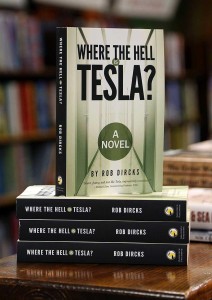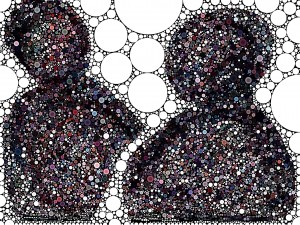 First, I didn’t set out to be a humorist. And I’ve only got one sci-fi comedy novel so far, Where the Hell is Tesla?, so I’m not sure I qualify as anyone you should listen to. But I’ve always loved funny sci-fi, like Douglas Adams’ The Hitchhiker’s Guide to the Galaxy, or John Scalzi’s Agent to the Stars, or Pratchett and Gaiman’s Good Omens, and I love the process of writing humor. It seems like a fit. I’m sticking with it.
First, I didn’t set out to be a humorist. And I’ve only got one sci-fi comedy novel so far, Where the Hell is Tesla?, so I’m not sure I qualify as anyone you should listen to. But I’ve always loved funny sci-fi, like Douglas Adams’ The Hitchhiker’s Guide to the Galaxy, or John Scalzi’s Agent to the Stars, or Pratchett and Gaiman’s Good Omens, and I love the process of writing humor. It seems like a fit. I’m sticking with it.
Along the way, I’ve learned a ton from great writers, and great teachers, and from screwing up in every conceivable way. So here are a few of my favorite little nuggets that you might find it useful in your own writing:
1. Exaggerated Contrast.
Imagine you move into your new apartment, and you go next door to ask if they signed for a package you were expecting. You’re invited in, and you find yourself in the middle of four adult males playing Dungeons and Dragons. With costumes on. Hmm. This might make a funny story to tell your friends later. But let’s exaggerate the contrast more by making all four of these guys over-the-top-crazy-smart scientists who revel in everything tech and sci-fi. Now what’s your story? The Big Bang Theory. A huge comedy hit, in its ninth season. A classic fish-out-of-water story pitting poor Penny against the ultimate geek squad.
Or take Dortmunder, the cat burglar hero from the old Donald Westlake novels. He’s literally the only sane person in an insane world filled with incompetent crooks, bungling cops, and inept villains. The result? He had so much comic potential he starred in twenty-five novels and short stories.
Why does fish-out-of-water work? Because the greater you can make the gap between the normal person’s perspective (Penny, Dortmunder) and the crazy world’s perspective (the four scientists, incompetents in general), the richer the vein of comic possibility. And science fiction can be even better, as your worlds are only limited by your imagination. Just look at Hitchhiker’s Guide’s hapless Arthur Dent, thrust into insanity on a galactic scale. And in my novel, the “fish” are two regular joes who find themselves trapped inside an “Interdimensional Transfer Apparatus” ““ where each dimension they visit is strange, and rife with comic opportunity.
2. The power of three.
Take a look at this exchange between two friends on a bridge.
Murph smiles. “Look. It’s only forty feet, and the water’s plenty deep. You first.”
Andy peers down, with one eye closed, gripping the railing for dear life. “What are you crazy? No way!”
“Come on. Okay, we’ll jump together. It’ll be fun.”
Andy shakes his head. “No, It’ll be death. Forget it.”
“I’ll buy you Skittles.”
“Hmm. The big bag?”
The first time Andy says no is the setup, describing the conflict. The second time he says no, it ratchets up the tension and validates his convictions ““ there’s no way he’s backing down. And the third time is the release and the punch line ““ not only has Andy reversed, but he’s made risking his life contingent only on which size bag of Skittles he gets out of the deal. (He must really like Skittles.) That’s the power of three.
Let’s not stop there, though. Who did you think this was? A couple of teenage boys? Now imagine they’re seventy-five. Suddenly we’ve added exaggerated contrast to goose the humor (old guys don’t jump off bridges, and I don’t know any that eat Skittles). Even think about the word “Skittles.” Okay, it’s cheap comedy, but the sound of the word “Skittles” is kind of funny. Different. The way it rolls off your brain when you say it. Plus, their little exchange is also”¦
3. Two friends arguing.
Listen to Where the Hell is Tesla?‘s heroes, Chip and Pete, after Chip discovers directions to Tesla’s interdimensional portal in a journal and tries to talk Pete into investigating:
“So, you want to check this thing out, right?”
“F**k no. What are you, an idiot?”
“Dude. What could possibly go wrong?”
“Classic. Cut to scene of us in jail. Or scene of us dead. Or scene of us God-knows-where in space-time.”
“Well it would be space, not time. It would be the same time no matter where we went. It’s a dimension machine, not a time machine. ”
“Oh, gee, now I totally want to go.”
The comedy tradition of two buddies who love each other but bicker like an old married couple goes way back to Laurel and Hardy’s “here’s another fine mess you’ve gotten us into.” (I’m sure it goes back even further, like ancient Egyptians had plays about roommates who couldn’t agree on how many humps a camel is supposed to have.) Abbott and Costello, Crosby and Hope, Chandler and Joey, the angel/demon couple of Aziraphale and Crowley in Good Omens, and David and John in John Dies at the End. The list goes on and on and on.
Why does it work? There is something about friendship (which we all love) and bickering (which we all indulge in) that feels familiar, and when exaggerated, reminds us how the foils of life, the things we fight about, are silly and kind of funny. And it creates conflict where the stakes aren’t too high. And it allows us to live vicariously through characters who say and do the things we secretly wish we could in real life.
4. Surprise.
There are a lot of things I love about Audition, Michael Shurtleff’s book on how actor’s should audition for roles (though it’s really about how to craft a good story). But my favorite is probably what he calls “Discoveries” ““ remembering always to ask yourself “what is new?” Surprise creates new ““ and potentially funny ““ conflict in a scene. An example: deep into Where the Hell is Tesla?, Chip wakes up from a particularly shocking experience with a surprise: he has a new foot. A furry one.
“I don’t care. I’d still rather have no foot. Nikola, you’re a man of reason. Would you want a furry alien foot? Truly, deep down in your heart? Wouldn’t you rather have a nice pair of crutches? Or a hand-carved mahogany peg leg? Please cut this thing off, will you?”
“Chip. We are obviously not going to cut off your new foot. Can you not see even one positive thing in this?”
Hmm. I hesitate. I look down at it. “Well, it’ll never get cold.”
5. Don’t be afraid of slapstick.
People fall down. Kids accidentally hit their parents in the crotch with frisbees. Moms drop birthday cakes on the floor. And you know what? It’s funny. It just is. America’s Funniest Home Videos is based entirely on that premise, and it’s in its millionth season. So don’t shy away from it ““ embrace it. Have your main character slap someone by accident while making a point. Have your villain bend over and split his pants. Have your hero drink what she thinks is lemonade, until the lab guy tells her it’s poison, and she spits it out in his face. BUT keep it relevant to your characters’ personalities and motivations, so it’s not just a one-off visual joke. Because”¦
6. It’s not about “jokes.”
One-liners are for stand-up comedians and movies like The Avengers. Don’t get me wrong, I love the fun of The Avengers, but I avoid things like serious action sequences punctuated by zingers, like this one after Thor hits Captain America’s shield: “It’s all in the swing.” In fact, that whole trailer is a great example of joke overkill – there’s a snappy one-liner every five seconds. Be careful of “jokes.” Jokes are empty unless they’re a natural extension of the situation and the character’s state of mind.
7. Playfulness.
There’s a security in writing comedy, knowing that as bad as it gets, even if minor characters die, it’ll never get THAT bad. So don’t forget to let them have fun. I love the way John Scalzi does this (I’m thinking about Agent to the Stars and Redshirts in particular.) Even in their lowest moments, trapped in an underground chamber, your characters can talk about how they hated the movie Ghost. Or during a torrential downpour on a dark night on a dangerous planet, have your hero skip through a puddle, remembering that was her favorite thing when she was a kid. In Where the Hell is Tesla?, I had the main characters, right in the middle of all the tension, have a pillow fight. The world is your oyster ““ slurp it up.
8. Heart.
Maybe the biggest thing with comedy (as with all storytelling, I guess), is instilling it with heart. Without real living, breathing characters with real feelings, you wind up laughing at them, instead of with them (if you laugh at all.) Think about all the characters I’ve mentioned in this post, or ones from your favorite sit-coms. When you get to know them, you bond with them, and when they fall down you feel bad (even though you’re laughing), and when they’re climbing a mountain you’re rooting for them, and when they say or do something funny, not only do you laugh, but you feel good about it.
Wow. I didn’t realize I’d actually have a point, but I guess that’s it. That it’s not about the laughs. It’s about the feeling that comes with the laughs: that kind of giddy, warm connection to a story and a character, that makes you feel good, feel a little glow, even after you’ve closed the book.
Reading Recommendations
If you’re interested in humor writing, I highly recommend:
- The Comic Toolbox, by John Vorhaus (indispensable, and the source of several of these concepts)
- Audition, by Michael Shurtleff (not specifically about comedy, but awesome for scene writing)
- 1984, by George Orwell (I’m kidding, if there’s ever been an anti-comedy, that’s it)
 About Rob Dircks
About Rob Dircks
Rob is author of the science fiction comedy novel Where the Hell is Tesla? His previous work, an anti-self-help book titled Unleash the Sloth: 75 Ways to Reach Your Maximum Potential By Doing Less, has the distinction of being the very first self-help book to prescribe taking a nap instead of mowing the lawn. Both books have been bestsellers (depending on your definition of “bestseller.”) He’s a member of SFWA (Science Fiction & Fantasy Writers of America), and owner of Goldfinch Publishing, a small (very small, wee in fact) assisted publishing service. He also owns and operates an ad agency, Dircks Associates. You can follow and contact him on RobDircks.com.
About Where the Hell is Tesla?
SCI-FI ODYSSEY. COMEDY. LOVE STORY. AND OF COURSE… NIKOLA TESLA.
I’ll let Chip, the main character tell you more: “I found the journal at work. Well, I don’t know if you’d call it work, but that’s where I found it. It’s the lost journal of Nikola Tesla, one of the greatest inventors and visionaries ever. Before he died in 1943, he kept a notebook filled with spectacular claims and outrageous plans. One of these plans was for an “Interdimensional Transfer Apparatus” – that allowed someone (in this case me and my friend Pete) to travel to other versions of the infinite possibilities around us. Crazy, right? But that’s just where the crazy starts.”
Enjoy this writing advice and want more content like it? Check out the classes Cat gives via the Rambo Academy for Wayward Writers, which offers both on-demand and live online writing classes for fantasy and science fiction writers from Cat and other authors, including Ann Leckie, Seanan McGuire, Fran Wilde and other talents! All classes include three free slots.
If you’re an author or other fantasy and science fiction creative, and want to do a guest blog post, please check out the guest blog post guidelines.






 As a writer, it’s normal to want to share stories about the diverse and interesting world around you. That can be difficult if you have to write a character with a completely different background and life experience than you. The important thing is to stay away from writing a stereotype or a character that’s unbelievable. To help you, this article will share five helpful suggestions to create excellent and multi-layered LGBT characters.
As a writer, it’s normal to want to share stories about the diverse and interesting world around you. That can be difficult if you have to write a character with a completely different background and life experience than you. The important thing is to stay away from writing a stereotype or a character that’s unbelievable. To help you, this article will share five helpful suggestions to create excellent and multi-layered LGBT characters.  About the Author: Ellie Coverdale, a writer and blogger at
About the Author: Ellie Coverdale, a writer and blogger at 


12 Responses
RT @Catrambo: Guest Post from Rob Dircks: 8 Ways to Make Your Writing Funnier: https://t.co/Oah1eDcum6
RT @Catrambo: Guest Post from Rob Dircks: 8 Ways to Make Your Writing Funnier: https://t.co/Oah1eDcum6
RT @Catrambo: Guest Post from Rob Dircks: 8 Ways to Make Your Writing Funnier: https://t.co/Oah1eDcum6
@Catrambo Thanks Cat!
Huh. Well… how ’bout that.
I’ve used the “Power of 3” unwittingly in stories. I really like the effect. I will be more purposeful in the future.
Good read!
Andy Rogers liked this on Facebook.
Esther Hazleton liked this on Facebook.
RT @Catrambo: Guest Post from Rob Dircks: 8 Ways to Make Your Writing Funnier: https://t.co/Oah1eDcum6
Robert Eggleton liked this on Facebook.
Lee Whiteside liked this on Facebook.
I popped over here because I loved Where the Hell is Tesla. I see more why it appealed to me so much. I loved every book Dircks mentioned–even 1984, though it is admittedly scarce on the laughs. Comedy is very difficult. I think it’s probably harder than a straight story because of having to balance the narrative and character development with the comedy. Tip too far either way, and you just have bad farce. I like to think I’m funny, but I know I can’t write fiction. The irony of Succesful comedy is it only works when it appears effortless, which is hard work (and why the Avengers’ joke fest didn’t quite work).
Warning ! Warning ! It’s probably not true.